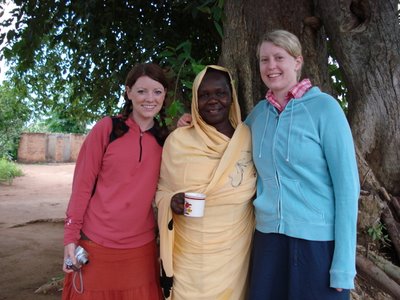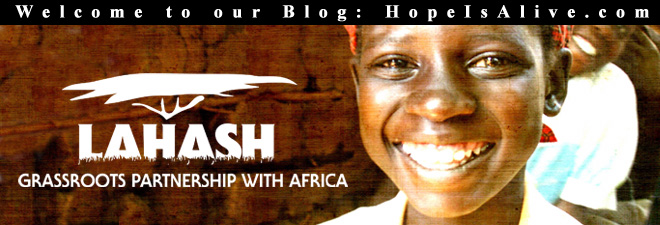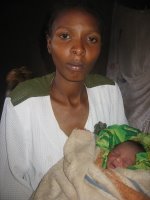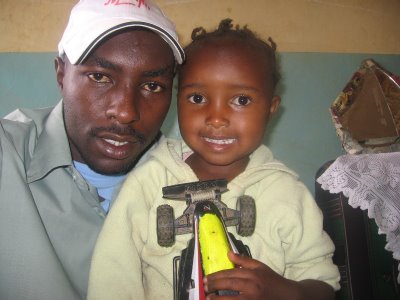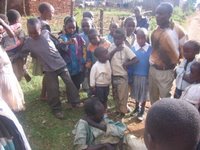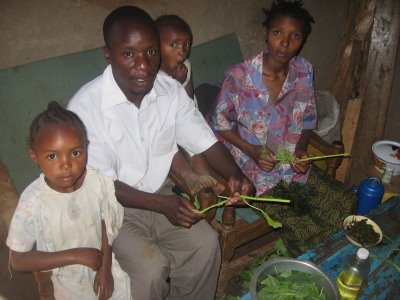 Trip to The Amazing Grace Orphanage
Trip to The Amazing Grace OrphanageBy Rebecca Mayer
If the bus ride was any indication of how our three-day visit to
Amazing Grace Orphanage in Adjumani would be, it would not go well.
After fighting our way through hordes of bodies yelling in foreign languages, we had stood in the aisle of a rocking, turbulent bus for four hours having lost the battle for a seat. Being the only two Americans on the bus apparently entitled us to nothing.

I primed myself for much of the same in Adjumani. I assumed my friend Brandi and I would need to be strong, independent American women in a culture that had much more defined gender roles – a culture that maybe would have written us out of things like traveling without men.
We fought our way out of the bus much in the same manner we fought our way on it, this time having a much better idea of this cultural game.
I was nervous, unsure of whether or not the African man on the other end of my phone call had understood when we were arriving. I prepared myself for being tough, decisive and bold.
The bus passengers pushed into us from behind as we neared the door of the bus, and boda boda drivers pushed into us from the front as they extended their eager hands to help their newest business clients off the bus.
I ignored them and attempted to keep moving. But, then I noticed one particularly friendly-looking dark hand reaching up at me. I looked at the face that belonged to the hand. “I am Ben from
Susan’s phone,” he said.

I grabbed his hand.
From then on, I knew we were going to be taken care of. My doubts of African hospitality that had cropped up during our roller-coaster bus ride flew out the window.
We collected our bags from the storage under the bus and met Ezbon and Kim, our American friend that we came to visit. Ezbon and Ben had already secured boda boda drivers, which they paid for. We went out for Cokes at a nearby café, which they again paid for.
Then we took the short trip by motorcycle to the Amazing Grace Orphanage. Grassy fields and Sudanese refugee camps swept by us on each side.
At the orphanage, our bags were taken to Kim’s tukul, where they had already moved in an extra bed with mosquito netting so we could all sleep together. We were escorted to a center tukul with windows. The table was set with mismatched placemats and doilies, and one of the girls brought in African tea on a platter and said a quick grace.
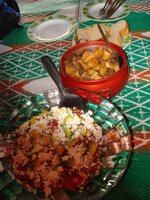
This was only the beginning of the kindness shown to us at Amazing Grace. After tea, we were told it was time for our baths, which was done by splashing lukewarm water on yourself from a basin behind a concrete wall. After that we were served dinner with meat – a rarity for poor Africans and a sacrifice they must have made just for us.
The next day was much of the same with food or tea served to us every few hours. The boldness I thought I needed was actually put to use asking
Susan how we could help her with day-to-day activities. Could we do the dishes? Could we go with the kids to the well? If we didn’t ask, it appeared that they would do nothing but pamper us.
Toward the end of the day, Ezbon, Ben and Susan gathered in the center tukul to tell the history of the orphanage and their lives. They all shared so willingly and thanked us for coming, though it seemed like we should be thanking them for taking such good care of us.

The night ended with a dance party, African pop music piping loudly through the air. The children proudly demonstrated their traditional dances, and then shifted to include us in the dancing using games that seemed to have no rules.
The trip turned out to be too quick, but I gained quite a bit.
Susan showed a depth of wisdom in recognizing that for single American women, a trip like ours took sacrifices – though I’m hesitant to even compare ours with Susan’s. Her hospitality was greater than any I’d seen before because I saw the measure of her sacrifice.
And knowing that – I as an American woman and
Susan as an African woman – came to a mutual respect for the other those few days. Though we each have vastly different stories, we both have sacrificed for what we believe in.
And just for the record, the return bus trip ensued with a far lower chaos rating.
* You can read more of Becca Mayer's thoughts and see more of her photos on her recent blog at Unwritten Memoir